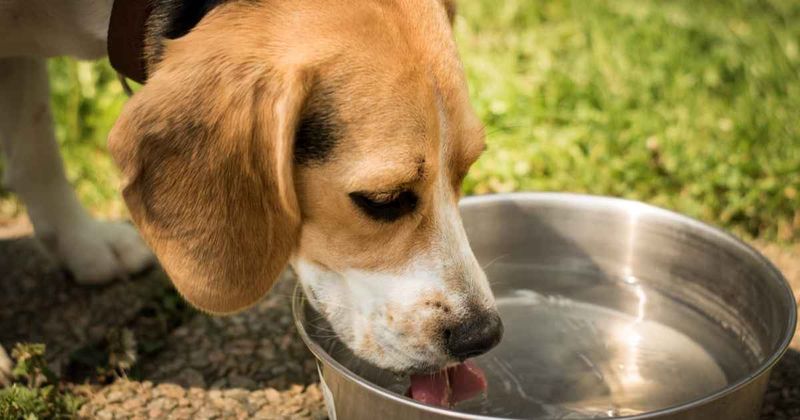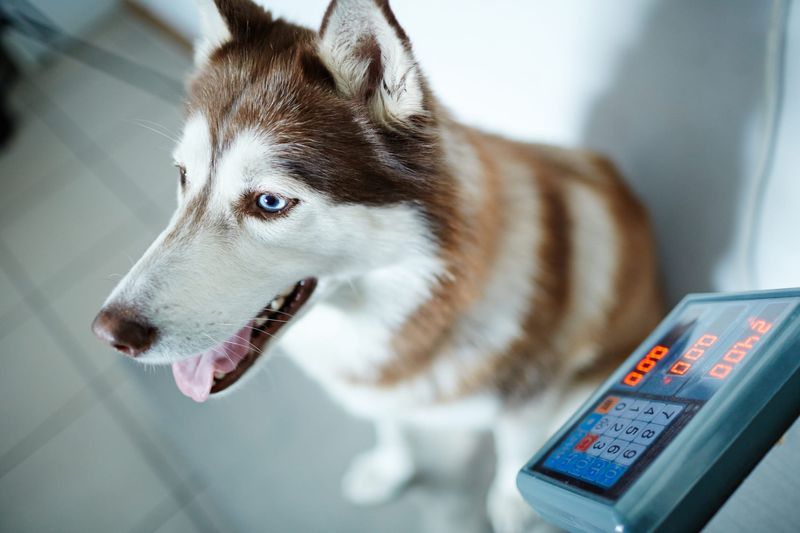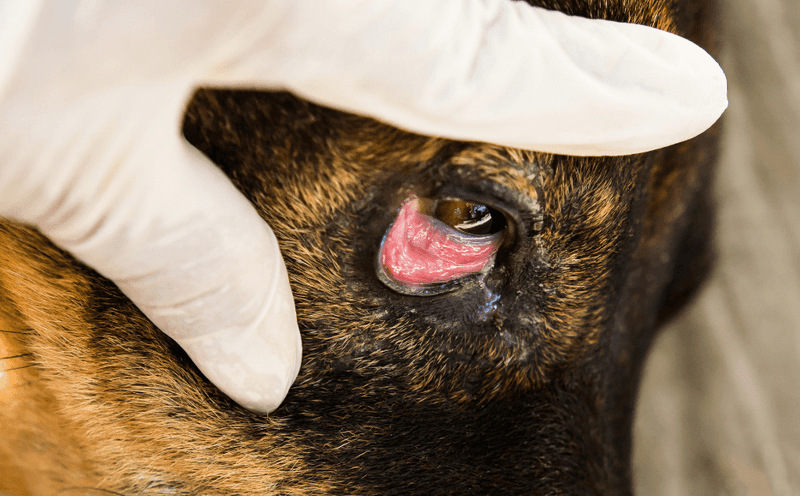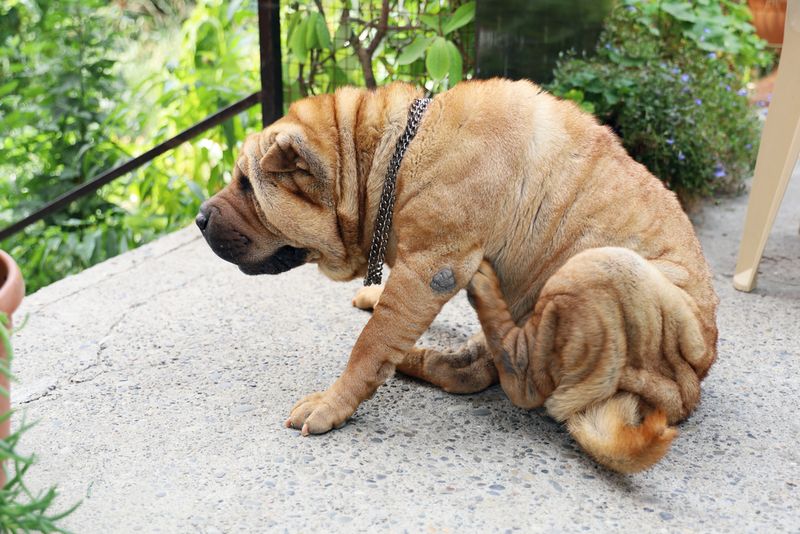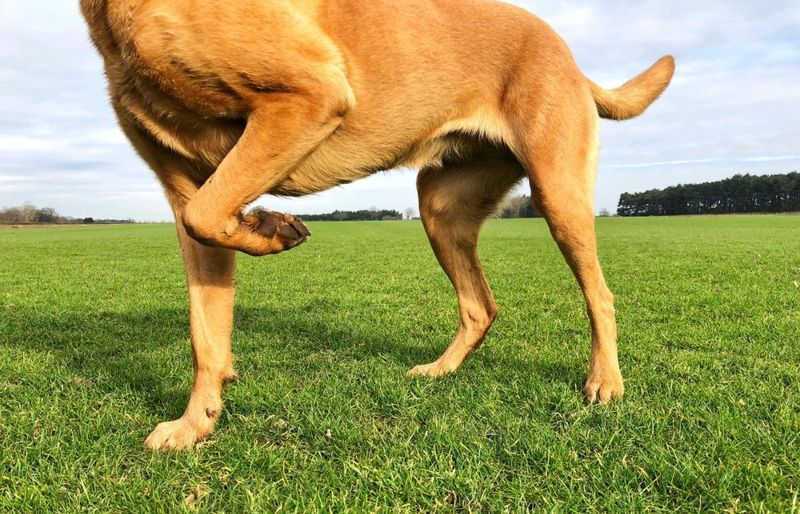Dogs can’t tell us when they’re feeling under the weather. As pet owners, we must pay close attention to their behavior and physical condition. Recognizing these signals early can mean the difference between a quick recovery and a more serious health issue. Here are 13 clear signs your dog might be sick or in pain, helping you become a more attentive and proactive pet parent.
Excessive Thirst
Sudden increased thirst can be alarming. While dogs need water, excessive drinking might indicate underlying issues. Notice your pet’s drinking patterns.
If they’re frequently at the bowl, conditions like diabetes or kidney disease might be at play. Monitor this behavior, especially if paired with other symptoms.
Always provide fresh water, but seek veterinary advice if drinking becomes obsessive. Early detection can avert more critical problems, ensuring your dog remains healthy and vibrant.
Lethargy
A once-energetic pup suddenly turning into a couch potato might signal lethargy. Dogs, known for their zest for life, should exhibit consistent energy levels. Unexplained fatigue can stem from numerous causes.
Infections, chronic conditions, or pain might be at the root. It’s crucial to observe any accompanying symptoms. Lethargy, when persistent, warrants a vet visit.
Ensuring your furry friend receives the necessary care can rejuvenate their spirits and maintain their quality of life.
Persistent Coughing
Coughing is more than a mere nuisance for dogs. A persistent cough could hint at a variety of ailments, from respiratory infections to heart disease.
Understanding the type of cough can offer clues. Wet or dry? Frequent or sporadic? Even environmental factors like dust can play a role.
Pay attention and consult your vet if the coughing persists. Timely intervention can prevent complications, safeguarding your beloved pet’s health.
Vomiting or Diarrhea
Digestive distress is a clear sign something’s amiss. Occasional upset stomachs happen, but repeated vomiting or diarrhea shouldn’t be ignored.
These symptoms can indicate allergies, infections, or even ingestion of harmful substances. Hydration is key, especially when dealing with diarrhea.
If episodes persist, consult your veterinarian. Early diagnosis can prevent dehydration and uncover underlying issues, keeping your pet healthy and happy.
Weight Changes
Unexplained weight fluctuations in dogs can signal health problems. While some breeds naturally vary in size, sudden changes warrant attention.
Whether gaining or losing, these shifts could point to metabolic disorders, thyroid issues, or even cancers. Regular check-ups ensure weight stays within healthy limits.
Monitoring your dog’s diet and exercise is vital. Addressing weight changes promptly can improve their quality of life and prevent future complications.
Lack of Appetite
Imagine your dog ignoring its favorite dish. A sudden lack of appetite can indicate discomfort. Dogs typically relish their meals, so skipping a meal here and there isn’t alarming, but prolonged disinterest requires attention. Assess their eating habits.
A drop in appetite might be a sign of stress, dental issues, or something more serious. Even if the solution is a minor adjustment, it’s essential to address the root cause. Visit your vet if your dog persistently avoids food, ensuring their health and happiness are maintained.
Remember, early intervention can be vital for a swift recovery.
Bad Breath
While doggy breath isn’t usually minty fresh, extreme bad breath might indicate dental or health issues. Regularly check your pet’s mouth.
Tartar buildup, gum disease, or even more serious conditions can cause foul odors. Maintaining oral hygiene is crucial for overall health.
Consult your vet about dental cleanings and appropriate care. Addressing bad breath can improve not only your dog’s oral health but also their general well-being.
Change in Urination
Altered urination habits can be a red flag. Frequent urination, straining, or accidents indoors might suggest urinary tract issues or kidney disease.
Observe your dog’s bathroom behavior closely. Early detection can prevent more severe complications.
Consult your veterinarian if you notice persistent changes. Prompt attention ensures your pet’s comfort and health remain uncompromised.
Itching or Hair Loss
Constant itching or noticeable hair loss can trouble any pet owner. These symptoms often point to allergies, parasites, or skin conditions.
A dog’s coat is a reflection of their health. Regular grooming and observation can catch issues early.
Consulting a vet for persistent problems can ensure a proper diagnosis and treatment plan. Ensuring your dog’s comfort and appearance is part of responsible pet ownership.
Swollen or Red Eyes
The eyes offer crucial health insights. Swollen or red eyes in dogs can signal infections, allergies, or trauma.
Regularly check for any discharge or irritation. Early detection can prevent complications and preserve vision.
Seek veterinary advice for persistent or severe symptoms. Proper eye care is essential to maintain your dog’s quality of life.
Changes in Behavior
A dog’s behavior reflects its health. Sudden shifts, like increased aggression or withdrawal, may indicate underlying pain or illness.
Observing their interactions and temperament can provide critical clues. Consider stressors in their environment.
Addressing these changes with a vet can reveal issues needing attention. Understanding your dog’s behavior is key to ensuring their happiness and health.
Difficulty Breathing
Breathing difficulties are often a sign of distress. Labored breathing, excessive panting, or wheezing shouldn’t be overlooked.
These symptoms can arise from respiratory infections, heart disease, or allergies. Immediate attention is vital.
Visit your vet to explore causes and solutions. Timely care can alleviate discomfort and prevent serious conditions, ensuring your dog’s well-being.
Limping or Lameness
Limping often signals physical discomfort or injury. Whether from injury or age-related issues, it’s crucial to identify the cause.
Check for visible injuries or swelling. Persistent limping requires professional evaluation.
Addressing lameness promptly can prevent further damage. Ensuring mobility and comfort helps maintain your pet’s active lifestyle.

